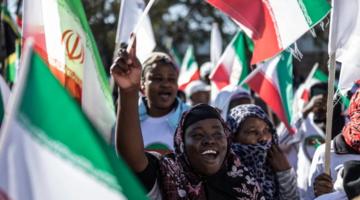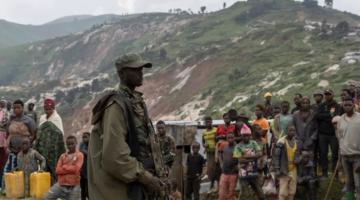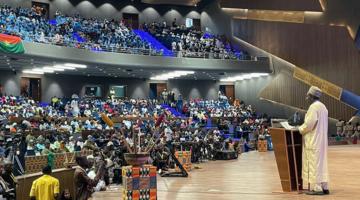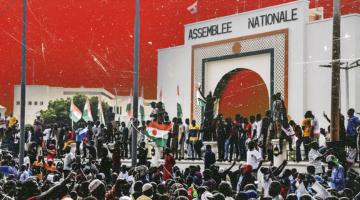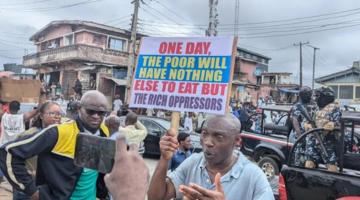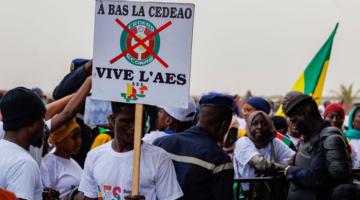This article was written on the occasion of the sixth summit between the European Union and the African Union which was held in Brussels on 17 and 18 of February 2022. These meetings are an opportunity for the African diaspora to play a role in bringing a Pan-African vision to discussions of Africa's future.
This article was originally published in Rete dei Comunisti.
The sixth European Union-African Union summit, scheduled for October 2020 and postponed due to the global health crisis, will be held on 17 and 18 February 2022 in Brussels. The Pan-Africanist activists who have decided to meet in Schuman Square will rightly be able to demonstrate on the topicality of the words of one of the founding fathers of Europe, the French Minister of Foreign Affairs Robert Schuman, who on 9 March 1950 declared that "Europe will be able, with increased means, to pursue one of its essential tasks: the development of the African continent".
In a world where projection zones are limited due to competition between powers, Africa is at the center of the geostrategic stakes between North, East and West. The link established between Mali and Ukraine through Russian politics shows more than ever the risk – ultimately unlikely – for Europe to find itself surrounded by a new type of alliance that extends from Moscow to Conakry through Kiev, Bangui and Bamako. As president of the EU Council for six months, Emmanuel Macron has stressed this on several occasions: without an African policy, Europe will disappear in the context of the great geopolitical upheavals underway. Faced with China, the United States, Russia and Turkey, which have created frameworks (summits and forums) to talk to Africa, Europe is simply playing for its survival.
Under the guise of being a "priority" linked to geographical proximity or "common destiny", Africa has become an obsession with Europe. Almost half of European countries now have a specific plan or strategy for Africa, not to mention the comprehensive strategy put in place by the European Commission, which will present new policy documents at the summit in the strategic areas of European security and defence, the energy transition, digital transformation, sustainable growth and jobs, peace and governance, migration and mobility. These are all issues on which the African peoples have never been consulted.
On the financial and humanitarian recolonisation of Africa
In 2017, the German presidency of the G20 launched the "Compact with Africa" to promote private investment in a dozen African countries (Benin, Burkina Faso, Côte d'Ivoire, Egypt, Ethiopia, Ghana, Guinea, Morocco, Rwanda, Senegal, Togo, Tunisia) that had reformed their macroeconomic framework. The neoliberal philosophy of this pact was extended to the summit of 18 May 2021 in Paris "on the financing of African economies". The latter are seen as "growth drivers" for European economies. In other words, without Africa, Europe sinks. Without natural resources, raw materials, but also immigrant workers, without new markets, new middle-class consumers and African elites, parts of the European economy threaten to collapse.
Far from being a project at the service of Africa, the "Global Gateway Strategy" unveiled by European Commission President Ursula von der Leyen therefore seems to be Europe's response to China, which has developed a vast network of transport and communication infrastructure in Africa as part of the Belt and Road Initiative. "). Through its "development agencies", Europe intends to present Africa with new economic, financial and trade instruments without even taking the time to listen to what Africans are asking for. In the end, nothing is more colonialist than Europe believing it is more ambitious for Africa than Africans themselves are for their continent. This ambition transpires of recolonization.
If "redefining borders" is not officially on the agenda of the EU-AU summit, it is because Economic Partnership Agreements (EPAs) and previous neoliberal European policies have already redrawn the borders of a "useful" and a "useless" Africa according to the interests of multinationals. These work "à la carte", according to transnational, cross-border and international logics that exploit the international division of labor, the rules established by the World Bank and the International Monetary Fund (IMF) and the laws of the market.
In this sense, the launch of the African Continental Free Trade Area (AfCFTA) risks benefiting above all non-African economic actors who have funds, networks and organizations superior to those of African actors. Far from leading to the balkanization of Congo, on the contrary, and worse, the AfCFTA extends the open-door policy pursued in Congo to the entire African continent, turning it into a vast reservoir from which everyone will draw what they need.
Between the EU-AU summit in Abidjan in 2017 and the 2022 summit in Brussels, the health crisis crept into relations between the two continents. Media reports suggesting that vaccines should be tested in Africa reminded us of the colonialist and racist dimension of science and medicine. The pandemic has shown the extent to which Europe refuses to understand that African civilizations may have a different conception of well-being, health and healing. Obsessed with the race with China in the "donation of vaccines" to Africa, Europe freed itself from all ethics by not hesitating to send vaccines to Africa that were no longer recommended for European citizens.
Africa, which has gone through the pandemic without having to offer the Western media the expected spectacle of hundreds of millions of people dying of Covid-19, is in a situation of paradoxical begging linked to the communication presented by Europe that generously gives it vaccines. Africa's goal is to achieve health and medical sovereignty without having to endure the rhetoric of "humanitarian" recolonization. On this point, the meeting of Presidents Macky Sall of Senegal, Paul Kagame of Rwanda and Nana Akufo-Addo of Ghana with Uğur Şahin, president of the multinational BioNTech, raises questions. The point is not to produce BioNTech "vaccines" in Africa, but to have a public health policy backed by a system of values, bioethics and sovereign medical research. In a complete reversal of the situation, Africa does not have the vocation to become the vaccine factory of the world.
Eurafrica is the extension of Françafrique
If Europe cannot afford to have a closed, hostile and unstable Africa on its doorstep, the Europe-Africa relationship is above all vital for France, which remains the neocolonial power par excellence. "Our goal is to build Europe without destroying France," said another foreign minister French, Georges Bidault, in March 1953. From the beginning, Paris has sought to preserve its territory in Africa from foreign intrusion, making sure that European partners contribute to the burdens, especially in the economic and security fields. In fact, the European agreements are increasingly discreet, less frontal and more encompassing than the networks linked to the Elysée or the Ministry of Foreign Affairs French. Emmanuel Macron thus intends to take advantage of the presidency French of the Council of the European Union to extend France's African policy to its European partners, thus renewing the theme of Eurafrica.
To achieve this, President French will be able to count on Senegalese President Macky Sall, who chairs the African Union for the year 2022. Strongly contested by a part of the Senegalese people and young people who accuse him of defending French interests before those of Senegal, Macky Sall follows in the footsteps of the poet and first president of Senegal, Léopold Sédar Senghor, who is known to be one of the great supporters of a Euro-African civil project that connects the two continents in an almost fictitious way, always for the benefit of European and neocolonial interests. Moreover, the rapprochement begun during Nicolas Sarkozy's time with Rwandan President Paul Kagame, one of the great architects of the African Union's neoliberal reforms, as well as the closeness between Emmanuel Macron and Ghana's Francophile President, Nana Akufo-Addo, give Paris the cards to have its political and economic line validated in Brussels by a group of African leaders.
Europe is also a vast conglomerate of public and private, state and business, civil and military, agricultural and industrial interests, all involved in a competitiveness that can only push them to look towards the high-potential lands of Africa that seem to be open to them. Thus, there are countless reports, statements and speeches that make Africa the future of Europe or the El Dorado of European growth. To think that the future of Europe is in Africa (in the African subsoils rich in oil, iron, uranium, coltan, gold, diamonds, manganese, etc.) is a way of saying – without presupposing it – that Europe no longer has a future, that it is absolutely incapable of reinventing itself and regenerating itself except by undertaking a new recolonization project. Europe must not be africa's burden. Europe, which has made Africa "its future", nevertheless offers the prospect of a future to a whole generation of young Africans, causing them to try to join at the risk of their lives.
While it refuses to recognize its slave and colonialist past through reparation policies, while refusing to engage in real plans to combat anti-black racism, while refusing to change its xenophobic paradigm on the issue of immigration, European leaders are calling on Africans to strengthen ties at a time when civil societies and young people in Africa itself are demanding a real rupture. As long as Europe positions itself as Africa's "partner" to delay Africa in its desire to win its full political, monetary, cultural, technological, energy and health sovereignty, more and more Africans will turn to alternatives that have proven their worth in history, such as pan-Africanism.
Pan-Africanism as a way to make Africa rise to its challenges
Ignoring "European" territories such as Martinique, Guadeloupe, Réunion, Guyana French, Mayotte and Kanaky, territories that remind us how much France is still a colonial empire, the AU-EU summit refuses to take note of the growing convergence between these "European" territories, which have strong historical ties with Africa. The EU-AU summit in Brussels, like the "Africa-France summit" in Montpellier, seems to be part of this logic of useless recovery of "pan-Africanism". That is why the diaspora, recognized by the African Union as its "sixth region", is strategic. At a time when Europe congratulates itself on having given 65 billion euros in official development aid to Africa, let us never forget that in the same period, the diaspora, which sends 83 billion dollars (in 2020) to its countries of origin, constitutes a real and indispensable economic and political force.
Only a true pan-Africanist vision linking the continental and diaspora dimensions to strengthen the mutual interests of Africans on the continent and the diaspora will make it possible to rebalance these asymmetrical "summits" where AU funding by the EU is no longer a secret. The more Africa privileges its diaspora, the more it will be able to deal on an equal footing with Europe, the United States or other large groups, benefiting from people who can defend its interests over time. As with any summit of this kind, there is a risk that African leaders will act as one in Brussels. The EU itself is divided on many issues, with Hungary and Poland for example threatening to refuse to recognise the resolutions of the EU-AU summit on the grounds that they have been deprived of stimulus package funds, yet the EU will be able to silence its disagreements in an attempt to benefit from the division of Africans.
What is feared for African leaders should not be the case with our organisations claiming to denounce this Europe-Africa Summit. The practice of "every man for himself" by African leaders requires that those who oppose them, especially the pan-African political organizations and citizen movements of the diaspora that will be present on February 17 and 18, 2022 in Brussels, set an example more than ever by embodying the words of Ghana's first president Kwame Nkrumah, "The forces that unite us are intrinsic and greater than the superimposed influences that keep us apart."
This is the price of Africa's emancipation!
Strength to mobilize the Pan-African Diaspora of Belgium!
Umoja ni Nguvu! The Union is strength!
Amzat Boukhari-Yabara is President of the Pan-African League UMOJA.

